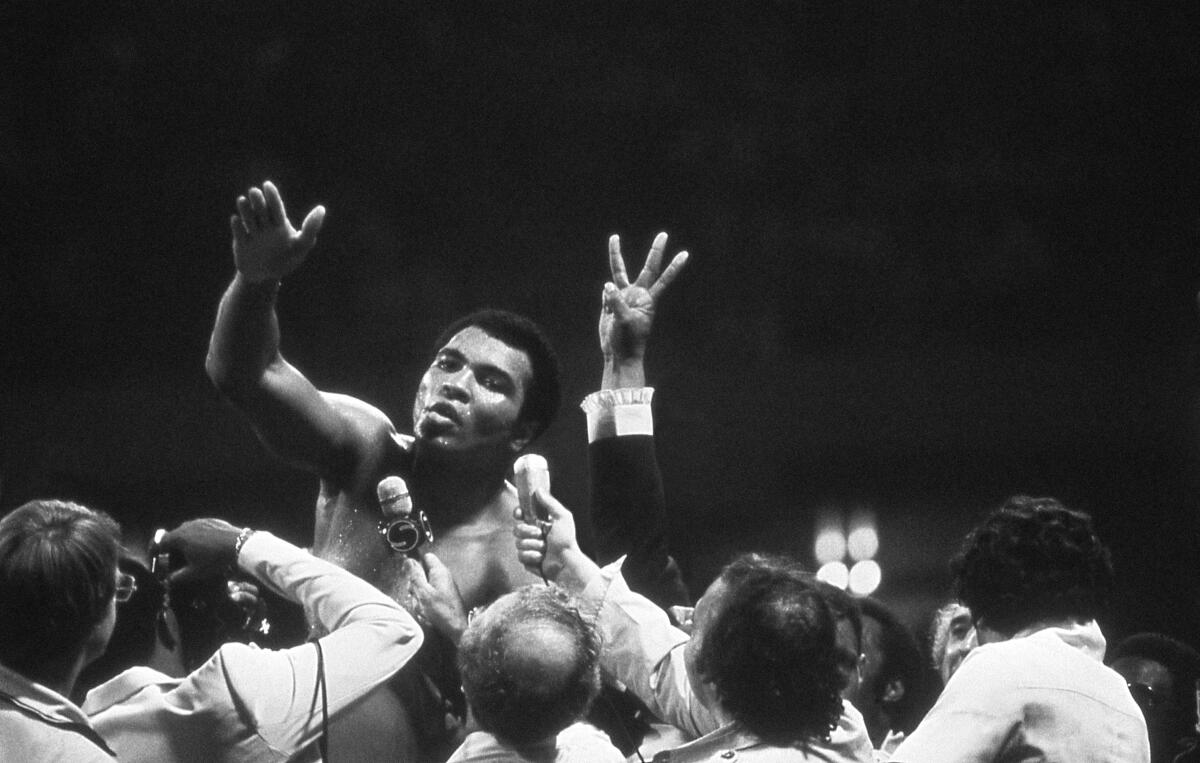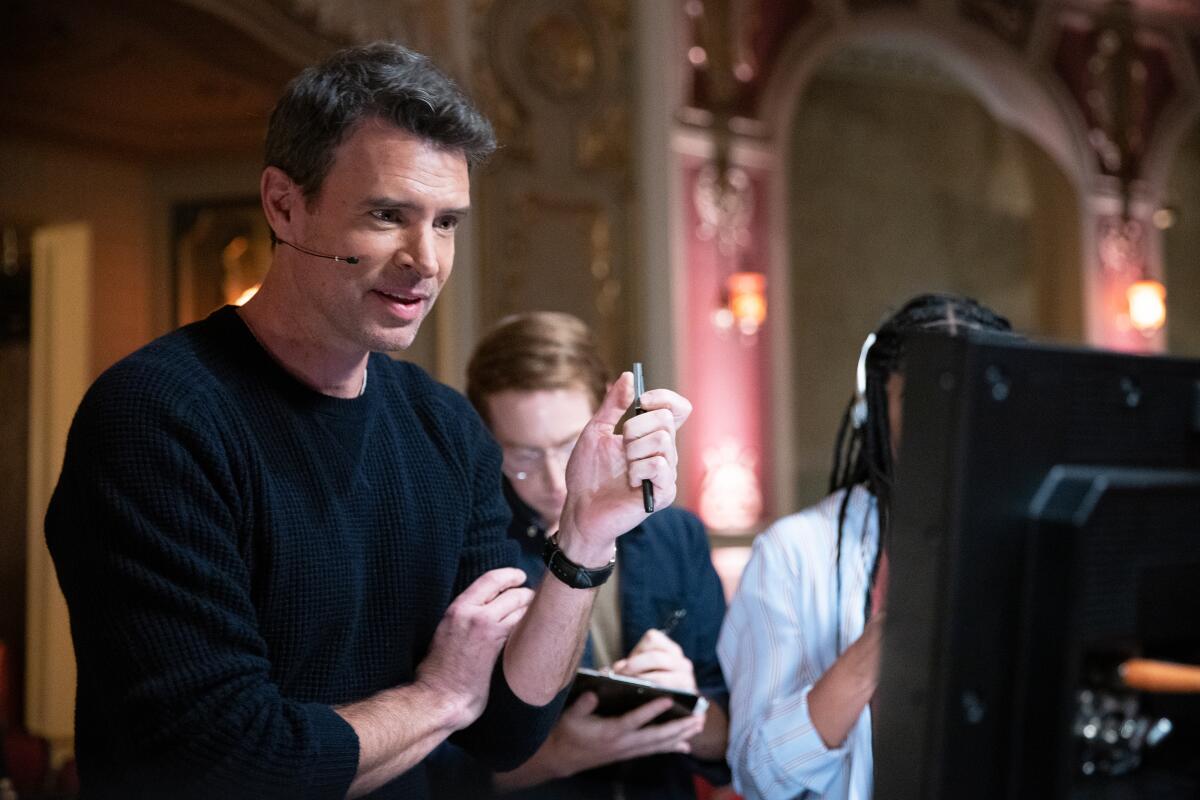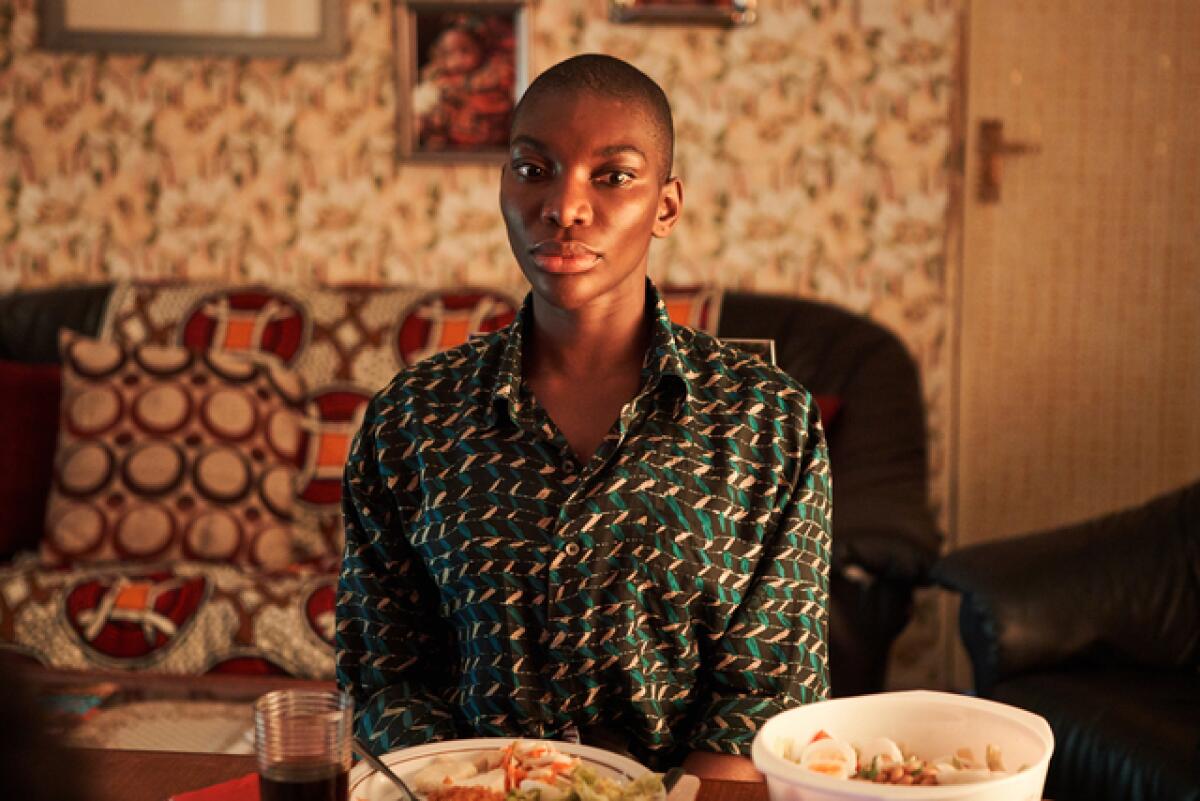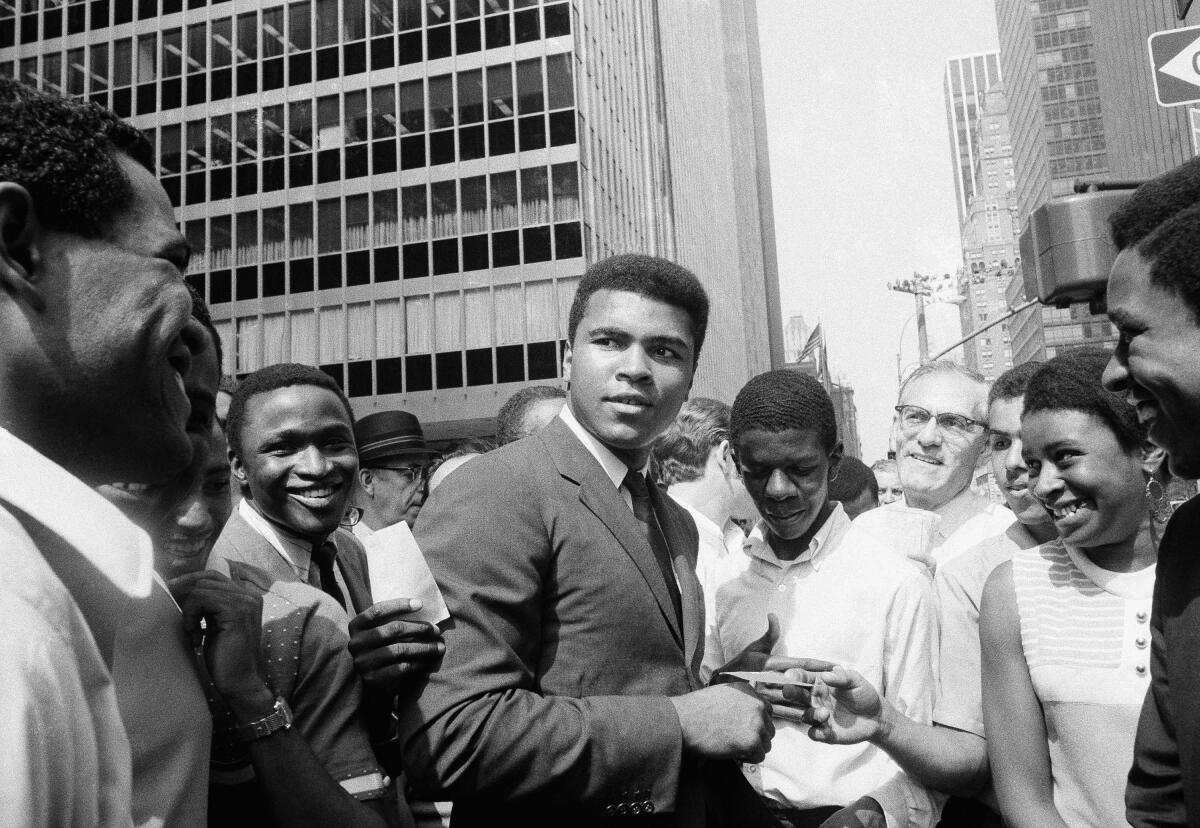The 5 Muhammad Ali projects to watch after you’ve finished Ken Burns’ docuseries

Welcome to Screen Gab, the newsletter for everyone wondering whether Hollywood is in for its first major work stoppage since 2007-08.
This week, as reported by The Times’ Anousha Sakoui, leaders of the International Alliance of Theatrical Stage Employees (IATSE), which represents 43,000 film and TV crew workers in Hollywood, called for a strike authorization vote as the union negotiates with the Alliance of Motion Picture and Television Producers (AMPTP) for fair wages, better rest periods, improved residuals and increased contributions to health and pension plans.
It would be the first crew member strike since March 1945 — an event known as “Hollywood’s Bloody Friday” — and the most significant disruption to production since the 100-day writers strike that began 14 years ago this November.
Producers, which include Netflix, Amazon, Warner Bros. and Walt Disney, are reluctant to meet IATSE’s demands, citing the costs of the COVID-19 pandemic. But as the union’s international president, Matthew Loeb, has said, “The AMPTP consists of some of the richest corporations on the planet, which have earned record profits on the back of our labor due to the unprecedented growth of video content streaming.” (Online subscriptions grew 26% in 2020 to more than 1.1 billion, with the pandemic dramatically accelerating long-standing shifts in consumer behavior.)
Authorization for the strike could come as early as Oct. 4, and while approval from membership doesn’t guarantee a walkout, it does mean that any shoot slated to start in October could potentially be at risk. The situation has reminded many of the 2007-08 writers strike, which also grew out of tension over how closely Hollywood contracts should reflect industrywide changes in viewing habits, economics and technology. One of the sticking points back then was DVD residuals.
Remember DVDs?
The complete guide to home viewing
Get Screen Gab for everything about the TV shows and streaming movies everyone’s talking about.
You may occasionally receive promotional content from the Los Angeles Times.
Turn on

“The Big Leap” (Fox). “‘Swan Lake’? Ballet? Is anybody gonna care?” asks Scott Foley’s character in the next episode of “The Big Leap.” I love that any overwhelming sentimentality about staging the classic dance piece with a group of amateurs is undercut by the fun, “UnReal”-like framing: a reality series documenting the journey, which Foley’s Nick Blackburn wants to turn into pulpy, must-see TV. “Otherwise, why not just go to the ballet and see ‘Swan Lake?’ Which, oh my God, how boring.” Catch up on the first episode on Hulu before the new installments Mondays on Fox. — Ashley Lee
“The Detour” (Hulu). With every passing season, all four of which are fortunately available to stream, I grew more convinced that “The Detour,” which ran on TBS from 2016 to 2019, was one of television’s greatest family comedies — by which I don’t necessarily mean it’s something to watch with your kids. (Though I don’t know your kids, it’s true.) Co-created by Samantha Bee and husband Jason Jones, it stars Jones, Natalie Zea, Ashley Gerasimovich and Liam Carroll as the Parkers, a family usually on the run toward or from something, or in hiding, sometimes from each other, and always from agents of the United States Postal Inspection Service. The series is a riot of conflicting yet somehow compatible tones that employs every sort of loud and soft, visual and verbal, sophisticated and slapstick comedy in the book and comes up with something oddly human and tender, the story of four people who should not and must be together. —Robert Lloyd
“Star Wars: Visions” (Disney+). A long time ago in a galaxy far, far away, George Lucas took inspiration from Japanese filmmaker Akira Kurosawa’s works and elements of Japanese culture to create “Star Wars.” So it’s only fitting that the seven Japanese animation studios tapped to create shorts for “Star Wars: Visions” have breathed new life into the franchise with their beautiful and exciting interpretations of what a “Star Wars” story can be. Without being tied to the rules of canon, each installment is able to capture different core elements of what fans love about “Star Wars” — from spectacular lightsaber fights to the strong bonds of found family and more — and present them in a style we have never seen within the franchise. Among the highlights are the over-the-top fight sequence in “The Twins,” the struggles of a band just trying to make it in “Tatooine Rhapsody” and the familial heartbreak in “Lop & Ochō,” but each of the nine shorts is breathtaking in its own way. —Tracy Brown
Catch up

Upon winning the Emmy on Sunday for writing “I May Destroy You,” (HBO Max), Michaela Coel — who also co-directed and starred in the extraordinary limited series — delivered the night’s quietest and most powerful acceptance speech, dedicating her work to “every single survivor of sexual assault”:
I just wrote a little something for writers. Write the tale that scares you, that makes you feel uncertain, that isn’t comfortable. I dare you. In a world that entices us to browse through the lives of others to help us better determine how we feel about ourselves, and to in turn feel the need to be constantly visible — for visibility these days seems to somehow equate to success — do not be afraid to disappear from it, from us for a while, and see what comes to you in the silence.
In a way, Coel’s remarks double as a statement of purpose for “I May Destroy You.” Inspired by her own experiences as a rape survivor, the series finds Arabella (Coel), a bright young writer in London, confronting her fear, her doubt and her discomfort as she tries to understand what happened to her, with the help of her friends Terry (Weruche Opia) and Kwame (Emmy nominee Paapa Essiedu).
The result, one of the best TV series of 2020, is a daring, often hilarious examination of sex, consent and the traumatic aftermath of sexual assault highly attuned to its heroine’s changes of key. Whether Bella is frenetic, ecstatic, dispirited or numb, the series conjures her moods with astounding exactitude — one club sequence early in the season will give you worse heart palpitations than a hit of molly — and defies narrative expectations at every turn, culminating in a radically structured, cathartic and, yes, surprisingly hushed finale that left me floored.
If you haven’t caught up yet, let the poetry of Coel’s Emmy speech — as much as the prize itself — be your inducement: There may be no artist working in television with a clearer voice, or a more well-honed sense of when, and how, to use it. —Matt Brennan
Guest spot

On “Impeachment: American Crime Story” (FX), which can only be viewed (for now) on cable, Sarah Paulson plays Linda Tripp, the polarizing whistleblower in the Bill Clinton-Monica Lewinsky scandal. I spoke with Paulson the day after she wrapped production on the 10-episode season in August. Here is more from our conversation that didn’t make it into the piece because my editor keeps telling me I don’t write for a magazine. —Yvonne Villarreal
In an interview from earlier this year, you talked about having regrets about doing “American Horror Story: Roanoke” on the heels of wrapping your stint as Marcia Clark in “The People vs. O.J. Simpson: American Crime Story” What were you feeling then and how are you feeling now after playing Linda Tripp?
I had this experience where I felt capable of something bigger — meaning, not in terms of size of the role, I just mean something that I wanted to ask more of myself. And “Roanoke” — just the character I played that year — wasn’t asking more of me. That season was the one time, had I had my wits about me, I would have turned to Ryan [Murphy] and said: I think it’d be best for me, as an actress, to sit tight and let the experience I just had playing Marcia just kind of be and not go diving into doing this thing that doesn’t really speak to me.
I had a conversation with my agent — and [“Impeachment” showrunner] Sarah Burgess when I was sobbing on the final day of shooting — about how I don’t know where I go from here. Because this feels big. It feels big for me, inside of me. And it took a long time. And it was hard and it was mentally challenging. And I was playing a complicated person who made really questionable choices that had enormous impact on many lives, but on one real person [Monica Lewinsky] who I’ve become friends with. ...This felt outside of my reach. I hope I get to reach that far again.
You’re very attached to this role. You are still wearing the replica of Linda’s ring on your hand. Is there anything else you kept?
I kept the teeth; I kept the nose prosthetic and I kept the mold that it goes on. I’m gonna get a Lucite box of some kind that’s temperature-controlled — sort of like what I did when Stevie Nicks wrote me a letter after [“American Horror Story: Coven”], I got like a Cheetos stain on it. I sent it to an art restorer and they like blew air on it and they were able to get the stain off and I was able to frame it properly. I’ve got [Linda’s] teeth, the glasses, my Linda Rose Tripp pin; I kept the ring and I kept the pillow — that pillow that I sit with when I’m in that one chair watching TV. It was a blue ruffled pillow. I kept that.
Break down

It’s clear by the end of the first chapter of Ken Burns’ epic, eight-hour docuseries “Muhammad Ali” (now streaming from PBS) that the legendary boxer was larger than life.
Ali, his colorful life story and his massive charisma seem to have been tailor-made for Hollywood, sparking dozens of projects from both mainstream producers and documentary filmmakers. The collection of films about and featuring Ali, including Burns’ documentary and the recent “One Night in Miami,” from director Regina King, would fill several shelves of a film archive.
Senior writer Greg Braxton selects five highlights from that extensive catalog to check out, including some entries that might be unfamiliar to viewers.
“Muhammad Ali: The Greatest” (VOD). Who better to play Ali in his life story than the champ himself? (We’ll revisit that question in a little bit.) Ali takes on the title role in this 1977 biopic, which starts with his gold medal victory at the 1960 Summer Olympics and concludes in 1974 with his famous “Rumble in the Jungle” battle with George Foreman. Ali’s magnetic screen presence makes up for his lack of acting chops in the film, which co-stars Ernest Borgnine and Robert Duvall.
“Freedom Road” (Tubi, Crackle). Two years after his Hollywood debut, Ali took a serious dive into acting in this miniseries, which has received little attention since it first aired in 1979. He plays former slave Gideon Jackson, who becomes a U.S. senator after the Civil War but encounters intense racism on his ascent. The champ’s low-key but convincing performance indicates he may have had a future in acting if he’d wanted it. Look for a young Alfre Woodard.
“When We Were Kings” (Showtime). The chaos and intense frenzy leading up to “The Rumble in the Jungle” is the focus of this fascinating 1996 film, which won the Oscar for documentary feature. The long lead-up to the fight, including an all-star music festival, was captured in detail at the time by filmmaker Leon Gast, then supplemented in the finished film with interviews with personalities including Spike Lee and Norman Mailer. Some of the most compelling footage shows thousands of Africans following Ali around, treating him like a hero.
“Ali” (Peacock). Coming back to the question of who’s a better choice to play Ali, Will Smith made a convincing case with his committed and commanding Oscar-nominated performance in this film from Michael Mann, which is at once a great sports movie and an excellent biopic. The boxing scenes are particularly effective, putting the viewer in the ring and making them feel what it might have been like in the ring with Ali.
“I Am Ali” (Starz). One of the most poignant and personal examinations of Ali is this 2014 documentary, which includes interviews with several important people in his life as well as others who crossed his path. The takeaway is Ali’s incredible love for family and how giving he was to those less fortunate. Tape recordings of phone calls between Ali and his daughter Hana when she was a young child are particularly touching. (Available on Amazon)
What’s next
Fri. Sept. 24
“Aly Raisman: Darkness to Light” (Lifetime). Three-hour documentary in which Olympic gold medal gymnast Raisman, who recently testified before the U.S. Senate on FBI mishandling of her reports of sexual abuse, meets fellow survivors.
“Birds of Paradise” (Amazon Prime Video). Theatrical feature in which young dancers vie for a prime spot with a Paris company. Not a reality show, nor a show about a reality show. Jacqueline Bisset is a selling point.
“Foundation” (Apple TV+). Isaac Asimov’s intergalactic rewrite of “The Decline and Fall of the Roman Empire” is beefed up with new characters, action, gadgets, gizmos and contemporary metaphors. With a chill Jared Harris as a man whose math can tell the future, probabilistically, and Lee Pace as Space Nero.
“The Great British Baking Show” (Netflix). We can argue about wouldn’t it be nice if Mel and Sue and Mary were still around, but the greatest of all British baking shows, back at last, has always managed to stay true to its inimitable, intermittently melancholy vibe.
“Midnight Mass” (Netflix). Horrorjinks with Hamish Linklater as a new priest in a little church on a remote island, where impossible things start to happen. From Mike Flanagan, who has a reputation in this field.
“The Starling” (Netflix). Melissa McCarthy and Chris O’Dowd are a couple dealing with the loss of a baby in different ways in a film Netflix paid $20 million to acquire. The starling here is a troublesome actual bird, not a metaphor, though probably also a metaphor.
Sun., Sept. 26
The 74th Annual Tony Awards (Paramount+). If a prop tree falls in an empty theater ...
“BMF” (Starz). Detroit-set, late 20th century drugs ’n’ thugs crime story — the title stands for Black Mafia Family — that the presenting network would prefer you see as “a story about love, kinship and capitalism in the pursuit of the American dream.”
“Nuclear Family” (HBO). Ry Russo-Young’s three-part documentary looks at the challenges faced by her lesbian mothers as they attempt to start a family in the less enlightened 1980s.
Tues., Sept 28
“La Brea” (NBC). Bonkers sci-fi disaster series in which a giant sinkhole opens up underneath Wilshire Boulevard over by the tar pits, perhaps in protest against that Zumthor LACMA building, launching a passel of luckless Angelenos into a world of dire wolves, saber-tooth cats and cavepersons.
Thurs., Sept. 30
“The Problem With Jon Stewart” (Apple TV+). Just when you thought he was out, he pulls himself back in, every other Thursday.
Mailbag
I read that in 2022, Warner Bros. will discontinue releasing its movies on HBO Max the same day as in theaters. When do they plan on making their movies available on the streaming service next year? How about the other studios with streaming services like Paramount+, Disney+ and Peacock? Thanks.
Larry Cauble
Atlanta
Staff writer Ryan Faughnder, whose newsletter The Wide Shot covers the business of entertainment, has the answer:
Larry,
Yes, after its controversial pandemic experiment, Warner Bros. will go back to releasing movies exclusively in theaters in 2022. The studio has signed deals with Regal and AMC to distribute films to theaters for 45 days before they become available through any kind of home video, whether that’s HBO Max or video-on-demand. But that’s not the whole story. Warner Bros. will also make 10 or so movies that will go directly to HBO Max. So half of the studio’s films will be theatrical, and the other half will go straight to streaming.
Inside the business of entertainment
The Wide Shot brings you news, analysis and insights on everything from streaming wars to production — and what it all means for the future.
You may occasionally receive promotional content from the Los Angeles Times.
Disney has adopted a strategy of flexibility. Many of its movies, especially the big Marvel and “Star Wars” titles, will be only-in-theaters at first. Still, Disney wants to keep its options open if it decides a movie would work better by debuting on Disney+ or through its $30 Premier Access scheme (which was how it unleashed “Black Widow” and “Jungle Cruise”). “Encanto,” the new Disney animated film, will be in theaters for only 30 days before heading to the streaming service.
As for Paramount+ and Peacock? They’re still experimenting, but you can bet the studios will be making more content just for those services. Universal is sending “Halloween Kills” to Peacock and theaters simultaneously, as it did with “The Boss Baby: Family Business.” Paramount released “Paw Patrol: The Movie” in a similar way, but through Paramount+. Paramount’s parent company just picked the digitally savvy Nickelodeon head Brian Robbins as the new CEO of Paramount Pictures, replacing the more old-school Jim Gianopulos. Many people see that as a sure sign that the studio is set to become more of a content factory for streaming.
—Ryan
Want to know more about one of the filmmakers we’ve interviewed? Need a new show to binge now that your fave is done for the season? If you have a question about TV or streaming movies for the pop culture obsessives at The Times, send it to us at [email protected] and you may find the answer in next week’s edition.
The biggest entertainment stories
Get our big stories about Hollywood, film, television, music, arts, culture and more right in your inbox as soon as they publish.
You may occasionally receive promotional content from the Los Angeles Times.



